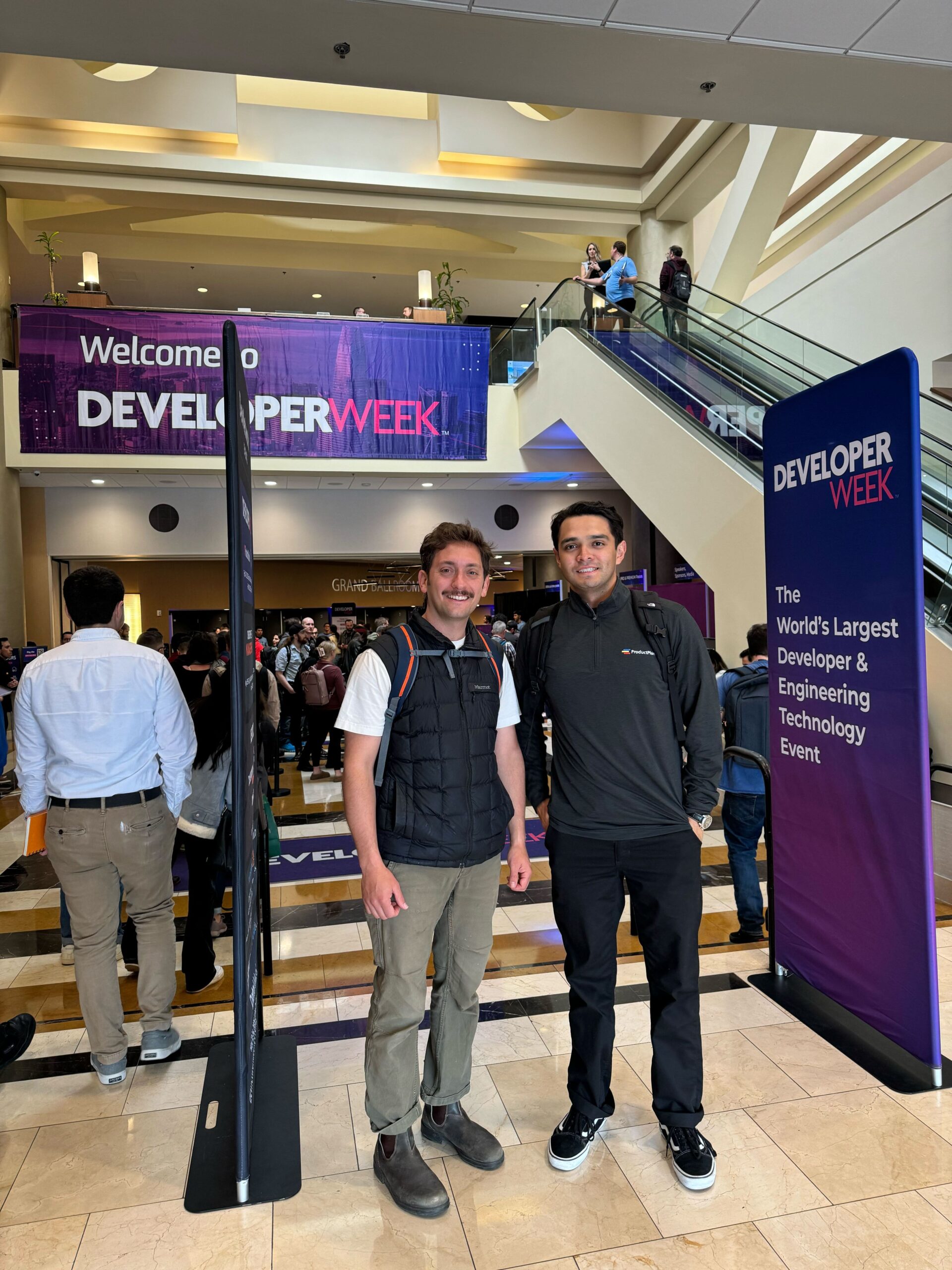As the Head of Product at ProductPlan, I spend a lot of time talking to product teams and learning about their experiences throughout the product development process. I am deeply familiar with their common refrains of endless roadmap review meetings, repetitive PowerPoint presentations, and the strain of constant context shifting.
Sometimes, it’s helpful to get out of the day-to-day and see things from a different lens.
I loved that stepping into ProductWorld’s Developer Week 2024 in San Francisco a few weeks ago reminded me of the other side of the product development experience. Engineers and development teams surrounded us—the people who collaborate with product teams daily—the often unsung heroes of building truly impactful products that solve real problems for real people.
It was a terrific experience hearing from my peers, mingling with fresh faces, and participating in great conversations about nurturing the coexistence of product and engineering with empathy, respect, and mutual accountability.
I came out of Developer Week with three key takeaways about how we can work together in their quests to design, build, test, and ultimately ship great products. Keep reading to learn more about my experience at the event!
#1 – The best product and engineering teams create shared accountability
Collaboration is the cornerstone of successful product and engineering teams, starting with effective communication. By working together and being transparent, product and engineering will see each other as partners seeking to achieve the same goals.
Product teams are responsible for creating a strategy and explaining the “why” behind the product. Their importance shouldn’t be overlooked or dismissed as not technical enough. Product’s role is crucial to the development of effective product strategy and stakeholder buy-in.
On the other hand, engineering must stay informed throughout the product development lifecycle and closely involved in problem-solving processes. They should not be dismissed as “ticket-takers” and can provide insightful guidance to the product.
Speakers and attendees alike emphasized the importance of utilizing robust communication tools, like our product management platform, to facilitate seamless collaboration and encourage shared accountability.
A collaborative mindset enhances teamwork and amplifies the overall impact of the product organization. In short, product teams should own outcomes while developers own the outputs. Together, they own the impact.
#2 – Successful execution requires a thoughtful strategy
Product management and project management are often confused with one another, but they are two distinct roles that serve different purposes. Project managers should work closely with product teams to create thoughtful and realistic plans, similar to how engineering teams rely on product expertise for strategy. Successful product execution requires a thoughtful balance between ambition and probabilistic planning from product and project managers.
Justin Meyer, CEO of Bitovi, shared valuable insights and practical strategies during his presentation “Building and Maintaining Actionable Multi-team Plans.” At Bitovi, they help product teams strengthen confidence in their estimates by taking a data-driven approach to planning. They build formulas with standard deviations around confidence in effort estimates to ensure realistic forecasts. This approach helps stakeholders identify critical paths and dependencies and promotes communication and shared accountability for the teams that are working together.
Product should also be prepared with thoughtful problem statements and have clear recommendations for an effective sequence of tasks. Each step is interdependent, underscoring the importance of creating mutual buy-in early in the product development lifecycle. To manage effective sequencing, Meyer suggested reducing scope, adjusting resources, and addressing confidence issues promptly.
The overarching goal of probabilistic planning is to expedite tasks with heightened confidence. All things considered, Product has a crucial role in the planning process. When alignment on the “what” and “why” is established, uncertainty about the “how” becomes secondary, fostering a conducive environment for successful execution.
#3 – Expect the unexpected and learn to adapt
In an era of rapid technological advancements, it’s not just about having great ideas but mastering the art of embracing change and adapting swiftly to unforeseen challenges. Learning to pivot is not just a skill but a survival necessity. The conference drove home the importance of acknowledging this reality early on, urging product leaders to embrace agility to succeed.
Although some things are out of your control, even the most minor expected setbacks can become opportunities for success.
Lindsay Harman, Senior Product Manager at Sirius XM, elaborated on ways to pivot and innovate in her presentation “Making the Most of Failed Products: Pivoting Your Roadmap and Goals When Things Don’t Go as Planned.” In one exercise, she had the audience imagine that they worked at a medical device company that recently released a wearable product to improve memory. But after going to market and finding early success, the FDA shuts them down for a side effect that increases the length of customers’ limbs… how should they pivot when confronted with this unforeseen obstacle?
This creative thinking exercise encouraged everyone to consider a new market. Is the “limb-lengthening” side effect desirable for some people? Is there an opportunity to sell to them and consider a new market? Although it was just an example, it was a fun and playful way to show the importance of adopting a mindset that welcomes unexpected change and adapts to survive.
How I’m bringing these insights into my work as a product leader
After attending the conference, I felt inspired by the valuable insights I could bring back to ProductPlan. The most important takeaway was that shared accountability is essential for collaborative success.
Firstly, shared accountability emerges as the foundation for collective success, reminding us that effective communication is the bridge that connects teams. The importance of a thoughtful strategy resonates clearly, urging leaders to find the right balance between ambition and probabilistic planning. And, of course, embracing change ensures survival and becomes the catalyst for innovation, setting our product teams up to be resilient.
Together, these key learnings form a compass guiding us toward sustained success and excellence in the ever-evolving world of product leadership.
Where is ProductPlan heading next?
ProductPlan will also attend the Product-Led Summit hosted by the Product-Led Alliance in New York on March 20-21. Our team is looking forward to continuing our development as product leaders and would love the opportunity to connect while we’re in town.
Contact our team at events@productplan.com to connect with us.



